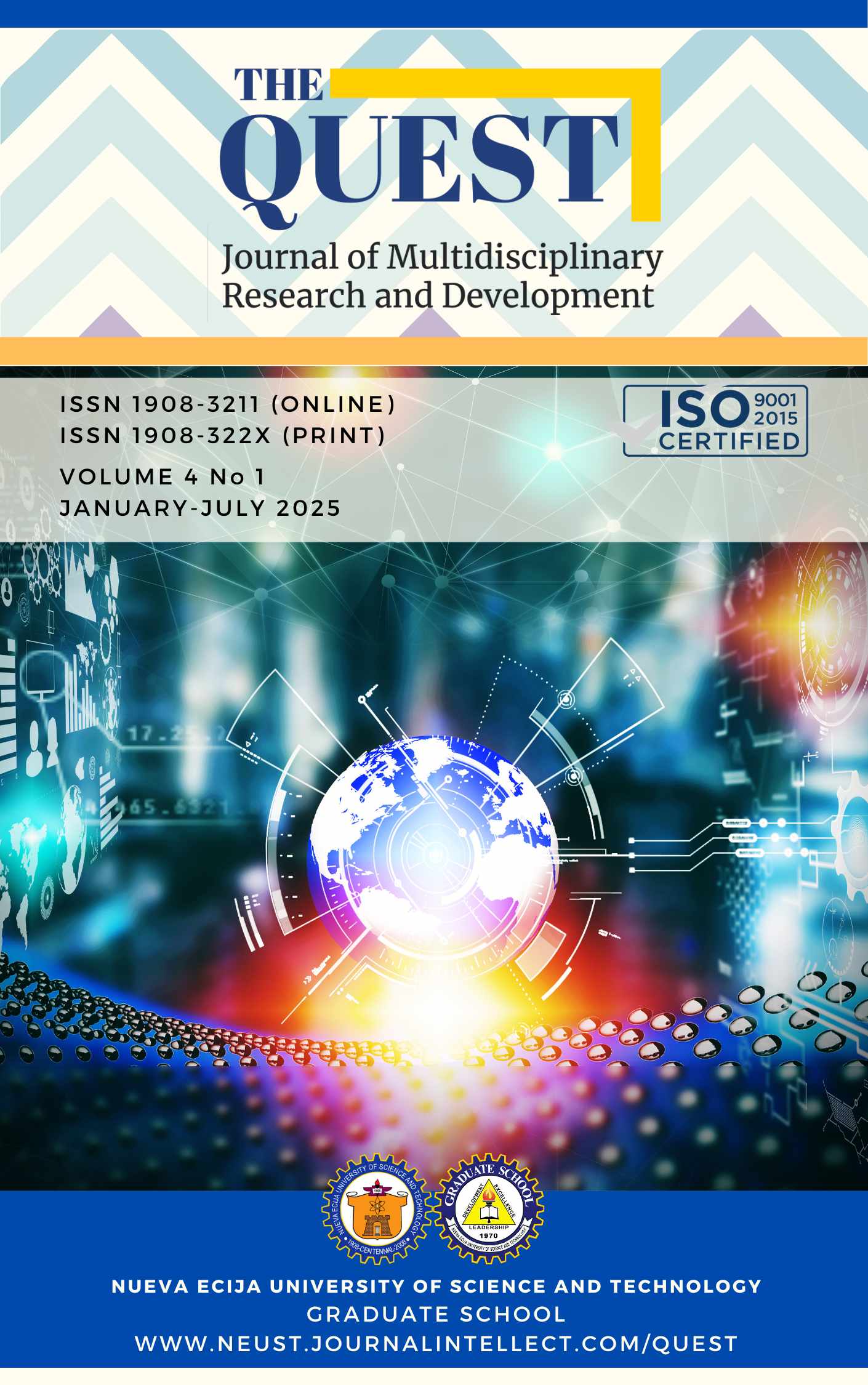Revisiting the Junior High School K to 12 Science Curriculum of Selected Regions in the Philippines

Published 06/30/2025
Keywords
- K to 12 Science Curriculum,
- Curriculum Implementation,
- Resource and Process Variables,
- Teacher and School Demographics,
- Curriculum Challenges and Effectiveness
How to Cite
Copyright (c) 2025 The QUEST: Journal of Multidisciplinary Research and Development

This work is licensed under a Creative Commons Attribution-NonCommercial 4.0 International License.
Abstract
This study examines the implementation status of the K to 12 Junior High School Science Curriculum in the Philippines, addressing a knowledge void gap for research conducted post-2020. Previous studies have primarily focused on specific regions, limiting their applicability across diverse educational contexts. By employing a descriptive-survey design, the research assesses participants' perceptions of the Science curriculum's effectiveness based on three critical dimensions of practical curriculum implementation. The study gathers responses from 16 school heads and 144 science teachers across Regions I, III, and V. A structured questionnaire, adapted from prior research, evaluates demographic factors such as sex, position, educational attainment, years of service, regional location, school size, and classification. Descriptive statistics provide an overview of perceptions, while inferential tests (Mann-Whitney U Test and Kruskal-Wallis Test) evaluate differences based on demographic profiles. Findings reveal that while the curriculum benefits from teacher expertise and adherence to standards, challenges remain regarding print resource availability, instructional time, parental involvement, and teacher engagement in curricular decisions.
References
- Altun, M. (2017). The effects of teacher commitment on student achievement. International Journal of Social Sciences & Educational Studies, 3(3), 51.
- Baron, J. V., & Cruz, J. A. D. (2023). The spiral progression approach in teaching science: Its Volatilities, Uncertainties, Complexities, and Ambiguities (VUCA). Journal of Social, Humanity, and Education, 3(2), 89–103. https://doi.org/10.35912/jshe.v3i2.1194’
- Barrot, J. S. (2023). K to 12 curriculum reform in the Philippines: Towards making students future ready. Asia Pacific Journal of Education, 43(4), 1193-1207.
- Cabansag, M. G. S. (2014). Impact statements on the K-12 science program in the enhanced basic education curriculum in provincial schools. Journal of Arts, Science & Commerce, 5(2), 29-39.
- Corpuz, B. B. (2014). The spiral progression approach in the K to 12 curriculum. Retrieved on January, 21, 2017.
- Darling-Hammond, L., Hyler, M. E., & Gardner, M. (2017). Effective Teacher Professional Development. Palo Alto, CA: Learning Policy Institute
- Epstein, J. L., Sanders, M. G., Sheldon, S. B., Simon, B. S., Salinas, K. C., Rodriguez Jansorn, N., Van Voorhis, F. L., Martin, C. S., Thomas, B. G., Greenfield, M. D., Hutchins, D. J., & Williams, K. J. (2019). School, family, and community partnership: Your handbook for action (4th ed.). Corwin Press.
- Freundl, V., & Wedel, K. (2022). How does instruction time affect student achievement? The moderating role of teacher qualifications. In CESifo Forum (Vol. 23, No. 03, pp. 33-39). München: ifo Institut-Leibniz-Institut für Wirtschaftsforschung an der Universität München.
- Gordon, W. R., Taylor, R. T., & Oliva, P. F. (2019). Developing the curriculum: Improved outcomes through systems approaches (9th ed.). New York, NY: Pearson.
- Graham-Clay, S. (2024). Communicating with Parents 2.0: Strategies for Teachers. School Community Journal, 34(1), 9-60.
- Hattie, J. A., & Donoghue, G. M. (2016). Learning strategies: A synthesis and conceptual model. npj Science of Learning, 1(1), 1-13.
- Hattie, J., & Timperley, H. (2007). The power of feedback. Review of educational research, 77(1), 81-112.
- Irembere, W. R. (2019). Teacher involvement in school curriculum design and development in the Philippines: A case study. International Forum, 22(1), 87-105.
- Ligsanan, L. S., & Peria, J. N. (2024). Navigating the Intersection: A Phenomenological Exploration of Physical Science Teachers Teaching Biology. The Quest: Journal of Multidisciplinary Research and Development, 3(1).
- Macias, M., Iveland, A., Tyler, B., & Salcido White, M. (2022). Teaching K-8 Science through Distance Learning: Overall Impacts of the COVID-19 Pandemic. Policy Brief. WestEd.
- Mangali, G. R., Tongco, C., Aguinaldo, K. P., & Calvadores, C. J. (2019). Stories of Students toward Spiral Progression Approach in Science: A Phenomenological Study. International Journal of Multidisciplinary Research and Publications, 2(2), 27-48.
- Mertens, S. B., Flowers, N., Anfara Jr, V. A., & Caskey, M. M. (2010). Common planning time. Middle School Journal, 41(5), 50-57.
- Montebon, D.R. (2014). K12 Science Program in the Philippines: Student Perception on its Implemetation. International Journal of Education and Research 2 (12), 153- 164.
- Moslem, S., Ghorbanzadeh, O., Blaschke, T., & Duleba, S. (2019). Analyzing stakeholder consensus for a sustainable transport development decision by the fuzzy AHP and interval AHP. Sustainability, 11(12), 3271.
- Mugenda, O. M., & Mugenda, A. G. (2003). Research methods: Quantitative & qualitative approaches (Vol. 2, No. 2). Nairobi: Acts Press
- Resurreccion, J. A., & Adanza, J. (2015, March). Spiral progression approach in teaching science in selected private and public schools in Cavite. In Proceedings of the DLSU Research Congress (Vol. 3, pp. 1-12).
- Reyes, E., and Dizon, E. (2015). Curriculum Development. Quezon City. Adriana Publication Co. Inc.
- Rogayan Jr, D. V., & Villanueva, E. E. N. (2019). Implementation status of K12 social studies program in Philippine public schools. PEOPLE: International Journal of Social Sciences, 5(3), 233-250.
- Santos, L. F. (2017). The role of critical thinking in science education. Online Submission, 8(20), 160-173.
- Schanzenbach, D. W. (2014). Does class size matter?.
- Tirol, S. L. (2022). Spiral Progression Approach in the K to 12 Science Curriculum: A Literature Review. International Journal of Education (IJE), 10(4).
- Torres, R. A. A. (2023). Assessment of Grade Implementation 7 of the K to 12 Science Standards.
